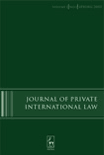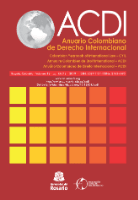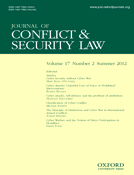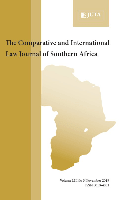
Public and Private International Law Bulletin
Scope & Guideline
Navigating the Complexities of International Law
Introduction
Aims and Scopes
- Comparative Analysis of Legal Frameworks:
The journal emphasizes comparative studies of legal systems, exploring how different jurisdictions approach similar legal dilemmas, particularly in areas such as constitutional law, human rights, and international treaties. - Human Rights and Humanitarian Law:
A core area of focus includes the application and implications of human rights law, particularly in relation to international humanitarian law, highlighting cases and legal interpretations that affect individuals and states. - International Arbitration and Dispute Resolution:
The journal provides insights into the mechanisms of international arbitration, including procedural aspects, enforcement of awards, and the evolving landscape of dispute resolution in a global context. - International Treaties and State Obligations:
Research often centers on the legal implications of international treaties, state responsibilities, and the complexities surrounding treaty interpretation and enforcement. - Cultural Heritage and International Law:
The protection of cultural property and heritage under international law is another unique contribution, particularly in the context of contemporary conflicts and state obligations. - Public International Law Developments:
The journal addresses significant developments in public international law, including discussions on sovereignty, statehood, and the role of international organizations. - Private International Law and Cross-Border Issues:
The exploration of private international law, particularly in relation to cross-border disputes, contracts, and family law, is a consistent theme within the journal.
Trending and Emerging
- International Human Rights Law in Conflict Zones:
A notable increase in research addressing human rights issues within the context of armed conflicts, particularly regarding the protection of cultural property and civilian rights, highlights the intersection of humanitarian law and human rights. - Impact of Technology on International Law:
The influence of technology, including artificial intelligence and satellite use, on legal frameworks and international relations is emerging as a significant theme, with implications for privacy, security, and international cooperation. - Child Protection in International Law:
Research focusing on the legal frameworks surrounding child protection, particularly in the context of international abduction and surrogacy, indicates a growing concern for children's rights in cross-border scenarios. - Economic Sanctions and International Law:
The legality and effectiveness of economic sanctions are gaining traction, reflecting ongoing debates about state sovereignty, international relations, and the impact of sanctions on human rights. - Transnational Legal Issues:
There is an increasing emphasis on transnational legal issues, particularly concerning migration, nationality, and the rights of migrants, which aligns with current global challenges. - Environmental Law and Human Rights:
Emerging discussions on the intersection of environmental law and human rights, particularly regarding transboundary harm and the implications of climate change on legal obligations, indicate a progressive trend in the journal.
Declining or Waning
- Traditional State-Centric Perspectives:
There seems to be a decreasing focus on traditional state-centric views of international law, as newer research emphasizes non-state actors, global governance, and transnational legal processes. - Historical Analyses of International Law:
Themes centered on historical perspectives of international law are less frequently addressed, indicating a shift toward more contemporary issues and practical applications of law in current global contexts. - Sovereignty in Isolation:
Discussions on sovereignty that do not consider globalization and interdependence are becoming less relevant, as contemporary legal discourse increasingly recognizes the complexities of global interrelation. - Legal Doctrines without Practical Application:
There is a waning interest in theoretical legal doctrines that lack practical application or case studies demonstrating their relevance in modern legal challenges.
Similar Journals

Journal of Private International Law
Bridging Legal Disciplines Across BordersThe Journal of Private International Law, published by Routledge Journals, Taylor & Francis Ltd, serves as a pivotal platform for the exploration and dissemination of scholarship in the intricate domains of law and international relations. Since its inception in 2005, this academic journal has committed itself to examining the nuances and evolving trends in private international law, offering valuable insights to researchers, legal practitioners, and students alike. Although it currently holds a Q4 ranking in both the Law and Political Science and International Relations categories, the journal's content contributes significantly to understanding cross-border legal issues and their implications. With exclusive access options, this journal aims to foster a global dialogue on pressing legal matters and encourages submissions that enhance theoretical frameworks and practical approaches. Join a community of scholars dedicated to advancing knowledge in private international law and related fields through this respected publication.

European Review of Private Law
Elevating the Standards of Private Law DiscourseEuropean Review of Private Law, published by KLUWER LAW INTERNATIONAL, is a distinguished academic journal that provides a comprehensive platform for scholarly research in the field of private law. With an ISSN of 0928-9801 and an E-ISSN of 1875-8371, this periodical features insightful articles, case studies, and reviews that contribute to the ongoing dialogue among legal scholars and practitioners. Although classified in the 2023 Q4 quartile within the law category, this journal fosters important discussions on pertinent aspects of private law, driving forward legal scholarship particularly in a European context. The journal operates under a traditional subscription model, ensuring a rigorous peer-review process for all submitted work. Its address is ZUIDPOOLSINGEL 2, PO BOX 316, 2400 AH ALPHEN AAN DEN RIJN, NETHERLANDS. The role of the European Review of Private Law is vital, serving as a conduit for fresh perspectives and developments that impact both legal theory and practice. Whether you are a researcher, a legal practitioner, or a student, this journal offers invaluable insights that resonate deeply within the legal community.

Anuario Colombiano de Derecho Internacional-ACDI
Exploring Pivotal Issues in a Globalized ContextAnuario Colombiano de Derecho Internacional-ACDI, published by UNIV ROSARIO, EDITORIAL, is a pivotal open-access journal established in 2008, focusing on the field of international law. Situated in Colombia, this journal serves as a vital platform for scholars, practitioners, and students to disseminate and discuss pivotal legal issues that resonate within an increasingly globalized context. With an impact factor reflecting its relevance—ranking in the Q3 category of law and positioned at the 33rd percentile among legal journals in the Scopus ranking—ACDI is a commendable source for academic research. The journal operates under a rigorous peer-review process, ensuring high standards of scholarly communication. Its commitment to accessibility fosters a broader dialogue among legal professionals worldwide, making it an essential resource for advancing knowledge and discourse in international law.

Vestnik Permskogo Universiteta-Juridicheskie Nauki
Exploring the Frontiers of Legal KnowledgeVestnik Permskogo Universiteta-Juridicheskie Nauki, published by the Perm State National Research University, serves as a prominent platform for the dissemination of legal scholarship since its inception. With an Open Access policy implemented in 2009, this journal offers a wide range of legal studies, including comparative law, constitutional law, and international law, making it an essential resource for researchers, academics, and practitioners in the field. Although it is a relatively young publication, its commitment to quality and accessibility has established it as a respected voice in jurisprudence, contributing significantly to both national and international legal discourse. Researchers and students alike will find valuable insights within its pages, encompassing the latest developments and theoretical advancements within Russian and global legal systems. For those looking to stay informed on current legal issues and academic debates, this journal is a must-read.

Journal of International and Comparative Law
Transforming Legal Research into Global ImpactThe Journal of International and Comparative Law is a premier academic publication dedicated to advancing knowledge and sparking critical discourse in the field of law. Published by SWEET & MAXWELL, this journal aims to bridge the gap between international legal standards and comparative practices, making it an essential resource for legal scholars, practitioners, and students alike. With an impact factor that positions it in the Q3 category of legal journals and a Scopus rank of #534 out of 1025 in the Social Sciences - Law category, it is recognized for its contribution to the legal community since its inception in 2018. The journal, based in Hong Kong, seeks to publish high-quality, peer-reviewed articles that reflect a diverse range of legal perspectives and methodologies. Although the journal is not open access, it remains committed to disseminating vital research and case studies that shape contemporary legal paradigms. Scholars and legal professionals can stay informed on authoritative insights by engaging with this important resource until 2024 and beyond.

Anuario Espanol de Derecho Internacional Privado
Illuminating the Path of International Private Law ScholarshipAnuario Español de Derecho Internacional Privado, published by IPROLEX, S L, is a pivotal journal dedicated to the field of private international law and its implications within the broader legal landscape. Based in Spain, this esteemed journal provides a platform for scholarly discourse, showcasing research articles, case studies, and critical reviews that contribute to the understanding and evolution of international private law practices. Despite its Q4 category status in the 2023 Law field and a ranking of #854/1025 in Scopus, it plays a crucial role in fostering academic growth and legal scholarship. The journal not only serves as a repository of knowledge for researchers and legal professionals but also as an essential resource for students seeking to deepen their understanding of international legal frameworks. Although it operates under traditional access modalities, its commitment to the academic community remains unwavering, reflecting the urgency and relevance of its content in contemporary legal discourse.

Journal of International Dispute Settlement
Pioneering Research in Dispute ResolutionThe Journal of International Dispute Settlement, published by Oxford University Press, serves as a pivotal platform for scholarly discourse in the realms of Law, Political Science, and International Relations. Since its inception in 2010, this esteemed journal has contributed significantly to the understanding and resolution of cross-border disputes, attracting a distinguished readership comprising researchers, practitioners, and students alike. With an impressive Q1 ranking in Law and a Q2 ranking in Political Science and International Relations as of 2023, it stands out as a respected source of high-impact research that explores both theoretical frameworks and practical implications of international dispute mechanisms. The journal is housed in the United Kingdom and is committed to fostering open dialogues on contemporary challenges in international law, thereby enhancing the knowledge base and informing policy-making. Look forward to innovative articles and critical analyses that push the boundaries of current research and pave the way for future advancements in the field.

JOURNAL OF CONFLICT & SECURITY LAW
Charting New Territories in Conflict and Security ResearchThe Journal of Conflict & Security Law, published by Oxford University Press, is an essential source of scholarly information in the fields of law, conflict studies, and security policy. With an ISSN of 1467-7954 and an E-ISSN of 1467-7962, this journal has been a significant platform for rigorous academic discourse since its inception in 2005. It is recognized for its contributions to the legal frameworks surrounding conflict and security, currently holding a Q3 ranking in Law and Q4 in both Safety Research and Safety, Risk, Reliability, and Quality for the year 2023. With its Scopus rankings placing it in the 61st percentile in Social Sciences Law, the journal serves as a key reference point for researchers and professionals looking to navigate the complexities of contemporary security challenges. Though the journal is not open access, its detailed analyses are critical for informed policy-making and academic inquiry, making it indispensable for students, scholars, and practitioners alike. For comprehensive insights and empirical studies, Journal of Conflict & Security Law remains at the forefront of legal and security research.

Melbourne University Law Review
Advancing Legal Scholarship with Insightful AnalysisMelbourne University Law Review, published by the MELBOURNE UNIV LAW REVIEW ASSOC, stands as a pivotal journal in the realm of legal scholarship in Australia and beyond. With an ISSN of 0025-8938 and an E-ISSN of 1839-3810, this esteemed publication has been a cornerstone for legal discourse since its inception. Designed to foster rigorous analysis and extensive debate, the journal covers diverse aspects of law, providing researchers, practitioners, and students an invaluable platform to engage with contemporary legal issues. The journal has demonstrated a commitment to high-quality scholarship, achieving a Q2 ranking in Law for 2023, further solidifying its importance within the academic community. Although not an open-access publication, the Melbourne University Law Review ensures that contributions remain accessible through institutional subscriptions, enhancing its reach and reinforcing its role as a critical resource for those dedicated to advancing legal knowledge and practice. For all stakeholders in the field of law—be they established academics or emerging professionals—this journal serves as a vital repository of innovative ideas and legal analysis.

Comparative and International Law Journal of Southern Africa-CILSA
Bridging Legal Systems for a Global FutureComparative and International Law Journal of Southern Africa (CILSA) is a prestigious academic publication dedicated to advancing the understanding of comparative and international law within the Southern African context. Published by the University of South Africa, Institute of Foreign & Comparative Law, CILSA serves as a critical platform for scholars, practitioners, and students to explore significant legal issues and developments that impact the region and beyond. The journal's ISSN is 0010-4051, ensuring its visibility and accessibility within academic circles. While CILSA currently operates under a traditional publishing model, it remains committed to providing high-quality, peer-reviewed research that addresses pressing legal challenges and promotes informed discourse. With a mission to bridge the gap between different legal systems and encourage comparative analysis, CILSA is essential reading for anyone invested in the evolution of law in a globalized world.